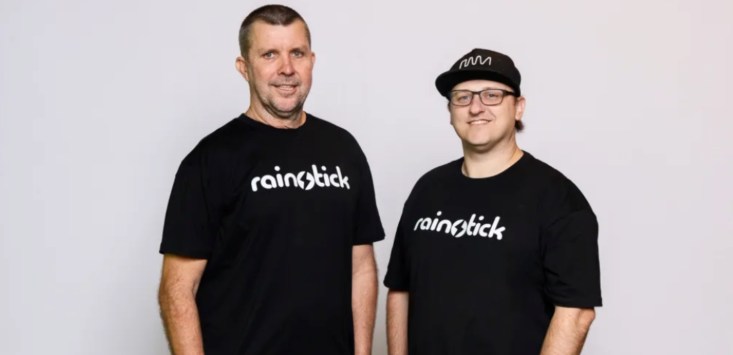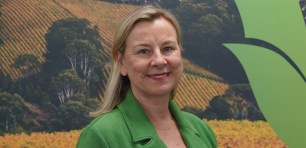
L-R: Darryl Lyons and Mic Black of Rainstick. Source: Supplied
A Queensland agtech startup is taking the future of food by storm, using ancient Indigenous wisdom to mimic the effects of lightning to grow bigger, stronger, more sustainable and resilient crops.
Inspired by the traditions of the Maiawali People of central west Queensland from which co-founder Darryl Lyons, the startup’s chief rainmaker hails, Rainstick has built on a 10,000-year-old practice that acknowledges the influence of lighting on how plants grow.
The Cairns-based biotech startup uses electricity to mimic the natural effects of lightning to grow bigger crops faster through its Variable Electrical Field (VEF) seed treatment technology that improves seed germination growth into seedlings.
By using chemical-free electric seed treatments, Rainstick is working with producers, scientists and agronomists to increase crop yields, improve global food security, and reduce extreme weather and climate change impact on food systems.
Australian government’s scientific research agency CSIRO conducted an independent trial in June 2023 on Rainstick’s VEF technology and how it could influence microbial behaviours, with the test concluding a significant potential in the technology to influence microbial populations.
Mic Black, the startup’s chief thunderstorm creator, said Rainstick was in the most exciting phase of a startup.
“Every month is a new eureka moment, collaborative partnership or milestone. My role is shared between leading the science team, and being active as a founder as we close our pre-seed round,” he said.
“I’m a third-time technical founder, although I find most of my time is invested in great people as we set our sights on an over 10-year journey.”
Black added that he had grown up on a farm and some members of his family have been farmers for generations.
“I understand how it can sometimes feel hopeless when farming in the traditional ways and needing to make it work,” he said.
“With widespread chemical bans, climate volatility, increasing population and ESG pressures, it’s a bit much.”
Black told SmartCompany that he has been involved with many farming technology trials and has previously built an advanced synbio startup.
Co-founder and proud Maiawali Man Lyons has also been a part of Farmers2Founders, QLD Drought Hub and other agtech initiatives.
“In hindsight, finding ourselves in agriculture isn’t all that surprising, but like most founders, what gets me up every day is a belief in the opportunity to make a significant change for the better,” Black said.
“Lightning in a box to germinate seeds doesn’t get much more ‘out-there’, and it’s wild ideas like this, followed by relentless pursuit that just might provide hope to the challenging multi-faceted problem of feeding the future population.”
Both Rainstick co-founders also recently attended the SXSW Sydney and the Asia-Pacific Agri-Food Innovation Summit, with Black also pocketing a personal win in the “Future of Agriculture” pitch category for the 2023 Singapore International Agri-Food Week (SIAW) in Singapore last week with an overwhelming 65% of the votes.
The founders have confirmed that they have also established their first three collaborative partners in Singapore off the back of the work in the lead-up to the event and presence at the event, acknowledging GROW Accelerator, AgFunder, TIQ, and AusTrade for their on-the-ground support in helping them establish great connections in Singapore.
Black said he doesn’t know how producers are meant to feed more people with less food.
“With population growth, regulatory pressures and so much volatility, we need something that can bring something new to the table,” he said.
“We are currently in trials with three major collaborators in Australia and about to enter into trials in Singapore. Because the technology is very versatile, we work with our collaborators to get the right balance of traits they are looking for in a species, variety and environment.”
Black said there are tiny biological “switches” inside plants that are sensitive to electric fields, which influences how plants grow and adapt to their environment.
“Rainstick mimics the natural effects of lightning in a controlled environment to improve seed germination rates, growth characteristics and increase yield. Increased germination means more seeds become plants,” he said.
“Increased yield means each plant makes more food and increased vigour means less loss due to pests, disease and climate effects, making food systems reliable again.
“Because we treat the seed, producers don’t need to change their on-farm processes making Rainstick much easier to adopt. We work with agronomists, seed treatment facilities and seed breeders to make sure we are making the maximum impact for our treatments.”
Black added both founders wanted to see Rainstick become the standard in understanding and leveraging the impact of electric fields on plants for the future of food both on Earth and beyond.
“We aim to bring a sustainable form of seed treatment to improve agricultural gains for all economies globally,” he said.
“The immediate next goal ahead of us is to diligently go from the lab and grow tunnel trials into the next scale implementation with our chosen partners.
“As exciting as the early results are, and as cool as lightning in a box sounds, it’s still a long road ahead and one we must take with discipline, diligence and humility, learning from nature and from those who have fed us for generations past.”
Handpicked for you

How SparkLabs Cultiv8 is shaping sustainable agtech in Australia



COMMENTS
SmartCompany is committed to hosting lively discussions. Help us keep the conversation useful, interesting and welcoming. We aim to publish comments quickly in the interest of promoting robust conversation, but we’re a small team and we deploy filters to protect against legal risk. Occasionally your comment may be held up while it is being reviewed, but we’re working as fast as we can to keep the conversation rolling.
The SmartCompany comment section is members-only content. Please subscribe to leave a comment.
The SmartCompany comment section is members-only content. Please login to leave a comment.